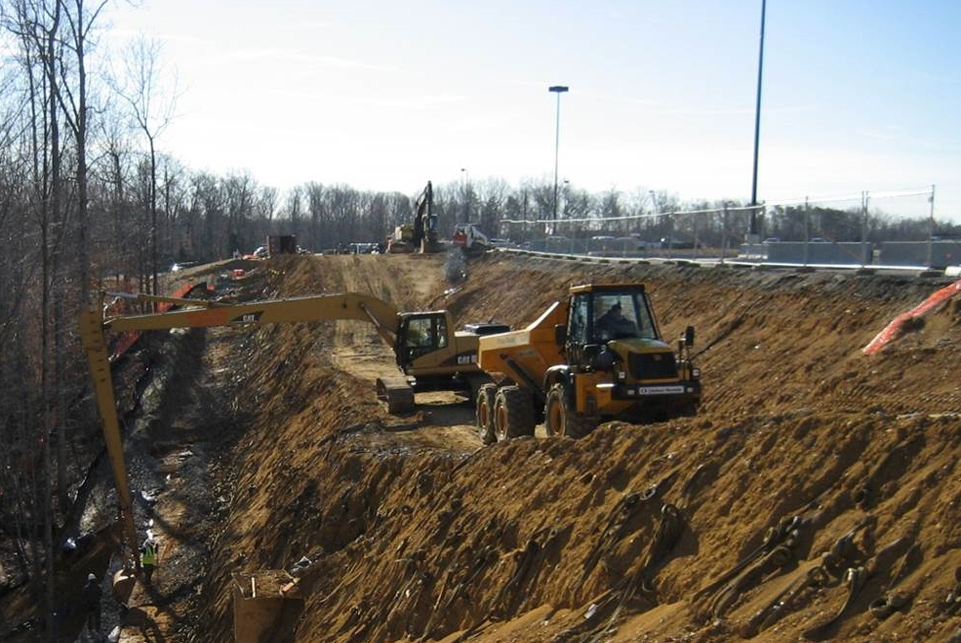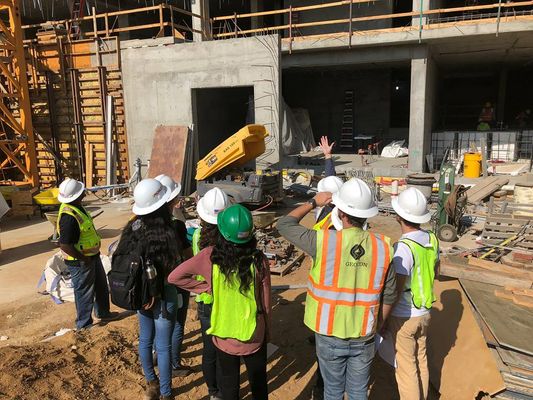Discovering the Benefits of Geo Tech Engineering for Urban Planning
Discovering the Benefits of Geo Tech Engineering for Urban Planning
Blog Article
A Thorough Review of the Secret Duties of Geotechnical Engineers in Site Characterization and Ground Enhancement Techniques for Engineering Solutions
Geotechnical engineers are indispensable to the successful execution of engineering projects, charged with the vital obligations of website characterization and the application of ground improvement techniques. Their job entails a detailed evaluation of subsurface conditions, employing numerous testing techniques to identify dirt and rock buildings.
Function of Geotechnical Engineers
Geotechnical designers play a critical role in the layout and building and construction of facilities by examining the behavior of dirt and rock underneath the surface - geotech engineer. Their duties incorporate reviewing subsurface conditions to inform design decisions that ensure structural stability and safety and security. By carrying out detailed evaluations of dirt residential or commercial properties, consisting of shear leaks in the structure, stamina, and compressibility, geotechnical designers offer crucial information that influences the choice of ideal building products and methods
Along with examining dirt mechanics, geotechnical engineers are charged with recognizing potential dangers such as landslides, sinkholes, and ground settlements. Their proficiency assists mitigate dangers related to these geotechnical sensations, consequently securing both the environment and public safety and security. They additionally team up very closely with various other engineering self-controls, ensuring that geotechnical considerations are integrated into general task layout.
Additionally, geotechnical designers engage in the examination of existing structures, supplying referrals for retrofitting and repair work when needed. Their extensive understanding of soil-structure interaction is crucial for the advancement of lasting infrastructure remedies. Generally, the role of geotechnical engineers is essential to the effective realization of building tasks, ensuring they are safe, resilient, and compliant with regulatory criteria.

Website Characterization Processes
Efficient website characterization processes are crucial for comprehending the subsurface conditions that affect job design and execution. Geotechnical designers use a methodical strategy to collect, review, and interpret data concerning groundwater, rock, and dirt qualities. This procedure starts with a thorough evaluation of existing literary works and archaeological site data, offering understandings right into previous site conditions and prospective difficulties.

Data analysis complies with fieldwork, where engineers use geostatistical approaches to translate searchings for and develop geological versions. Through thorough website characterization, geotechnical engineers lay the foundation for successful project execution, optimizing and lessening unforeseen difficulties source allocation.
Dirt and Rock Testing Approaches
While recognizing subsurface conditions is vital, the selection of appropriate dirt and rock testing techniques is similarly vital for exact evaluation and style. Geotechnical designers employ a selection of testing strategies to evaluate the mechanical and physical homes of dirt and rock products.
Laboratory tests, such as Atterberg restrictions, grain size evaluation, and unconfined compressive toughness examinations, supply vital information on dirt habits under different dampness problems and packing scenarios. These tests aid determine dirt category and anticipate settlement or shear strength characteristics crucial for foundation design.
In-situ testing methods, including Requirement Penetration Examinations (SPT), Cone Infiltration Examinations (CPT), and stress meter examinations, enable engineers to collect data directly from the ground. These methods use beneficial understandings right into the soil's thickness, uniformity, and stratification without the demand for extensive tasting.
Rock testing usually includes core tasting and lab analysis to evaluate homes like uniaxial compressive stamina and rock quality classification (RQD) Together, these soil and rock testing methods allow geotechnical designers to make educated choices relating to site-specific challenges, making sure the safety and security of engineering solutions.
Ground Improvement Methods
Ground renovation strategies are essential for enhancing the design residential or commercial properties of dirt, therefore boosting its load-bearing capacity and lowering negotiation. These techniques are crucial in resolving obstacles presented by bothersome or weak dirts, which can significantly influence the security and longevity of structures.
Different ground renovation techniques are utilized, including compaction, grouting, and soil stablizing. Compaction involves raising the density of dirt via mechanical means, which enhances its shear toughness and reduces compressibility. Grouting, on the other hand, includes infusing a liquid material right into the ground to load gaps and boost dirt communication. This strategy is particularly efficient for treating loosened sands or fractured rock.
Dirt stablizing includes a range of methods, from chemical additives to mechanical therapies, targeted at enhancing the soil's resistance to erosion and deformation. Techniques such as lime stabilization or concrete blending modify the buildings of the soil at a particle degree, improving its overall performance.
Significance of Geotechnical Evaluations
Geotechnical analyses play a critical duty in the preparation and layout of engineering tasks, as they provide vital information about the subsurface problems. Comprehending soil homes, rock developments, groundwater degrees, and potential geohazards is essential for making sure the stability and security of frameworks. These evaluations allow engineers to make enlightened decisions pertaining to site option, style specifications, and construction approaches.
The importance of geotechnical analyses extends past initial job stages; they are instrumental in threat administration and cost performance. By determining prospective concerns early, such as soil negotiation, incline instability, or too much groundwater, engineers can develop proper reduction strategies, decreasing the chance of architectural failings and costly delays. These analyses sustain conformity with governing requirements and enhance the sustainability of engineering methods.

Conclusion
To conclude, geotechnical engineers are crucial to ensuring the safety and security and stability of design projects with comprehensive website characterization and ground improvement methods. geotechnical eng. Their organized method to evaluating subsurface problems, incorporated with their recommendations for reliable ground modification, substantially improves soil residential or commercial properties and load-bearing capability. The knowledge of geotechnical designers not just facilitates educated job preparation yet likewise makes certain compliance with guidelines and cultivates reliable interaction among stakeholders, eventually adding to successful design outcomes
Geotechnical engineers play a crucial function in the design and building and construction of facilities by evaluating the behavior of dirt and rock underneath the surface. By conducting in-depth analyses of dirt properties, consisting of shear geotechnical industry compressibility, leaks in the structure, and stamina, geotechnical engineers provide critical data that affects the option of ideal construction materials and methods.
In addition to examining soil auto mechanics, geotechnical engineers are tasked with recognizing possible threats such as landslides, sinkholes, and ground settlements. Geotechnical engineers use a methodical strategy to gather, review, and analyze data relating to dirt, groundwater, and rock qualities. By determining potential concerns early, such as dirt settlement, slope instability, or too much groundwater, engineers can devise ideal reduction techniques, reducing the possibility of pricey hold-ups and architectural failures.
Report this page